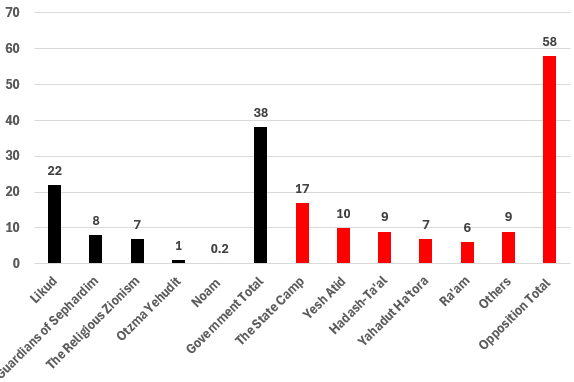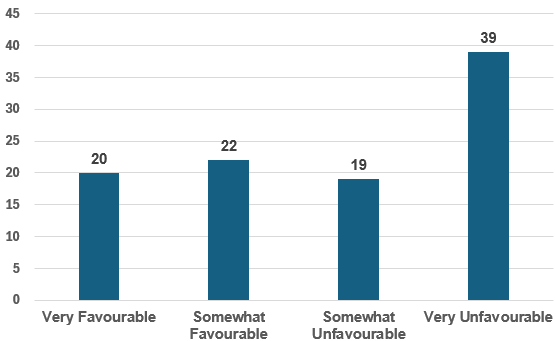Israeli Prime Minister Benjamin Netanyahu has accepted Trump's plan for peace in Gaza in principle – though he is likely to try and sabotage it. Paul Whiteley warns that this is a dangerous strategy given Netanyahu's current dire approval ratings among ordinary Israelis
In early October, Israel accepted the 20-point plan for peace in Gaza. It did so despite the fact that Benjamin Netanyahu has, in the recent past, sought to prolong the war with Hamas. But subverting the peace plan is unlikely to succeed because Netanyahu is now so very unpopular in Israel.
A 2024 public opinion survey showed that both Netanyahu and his coalition were very unpopular and, more recently, Israeli voters have increasingly lost confidence in his government. This means Netanyahu's coalition is likely to lose next year's election, and it may well collapse before then.
Netanyahu has done his best to avoid a ceasefire – even to the point of trying to kill the Palestinian delegation to peace talks in Qatar:
However, this policy appears to have run out of road. The United States has backed a comprehensive peace plan, which Netanyahu has had to accept. And there is another reason why Netanyahu has had to change tack: his unpopularity inside Israel itself.
Britain’s recognition of the Palestinian state follows that of France and Belgium. They now join the 80% of UN member states that have done this in the past. As a direct result of what the UN describes as the genocide in Gaza, the Israeli government has become even more isolated internationally.
As a direct result of what the UN describes as the genocide in Gaza, the Israeli government has become even more isolated internationally
A poll conducted in Israel for the Hebrew newspaper Maariv in August showed that 62% of respondents have lost confidence in Netanyahu's government, while only 27% retain confidence. Given this, it is interesting to examine the likely effects of these developments on Israel's next election, due on 27 October 2026.

The US polling company Pew Research conducts regular global attitude surveys. It releases the raw data from these surveys when they are no longer commercially valuable. This is something UK polling companies never do, despite the fact that it would promote transparency and make secondary analysis possible.
The most recent Pew survey, which is available in raw form, was completed in May 2024. It polled respondents in 35 countries, including Israel. The chart above shows support for the various political parties in the Israeli survey. Black columns are the parties in the government coalition; red columns the parties in opposition. The war had been going on for just over seven months when the survey was conducted. At that time, 38% of respondents supported the governing parties, and 58% the opposition parties.
As long as he clings to his Prime Ministership, Netanyahu remains immune from prosecution for alleged bribery and fraud
These figures help explain why Netanyahu wanted to keep the war going. If he could convince Israeli voters that he had achieved victory, this would boost support for his coalition. Moreover, as long as he clings to his Prime Ministership, Netanyahu remains immune from prosecution for alleged bribery and fraud. But his strategy has now failed for a number of reasons in addition to the US peace plan.
The first problem with keeping the war going is that it meant abandoning Israeli hostages, three of whom were, in December 2023, mistakenly killed by Israeli defence forces. How can Israel protect its hostages when it uses indiscriminate bombing to support its claim that it is trying to get the hostages released?
The second problem is that at the time of the survey, Benjamin Netanyahu was already relatively unpopular in Israel. The chart below indicates whether respondents had a favourable or unfavourable view of the Prime Minister. While 42% did have a favourable view, 58% disapproved. More to the point, almost 40% had a very unfavourable view, revealing how deeply disliked Netanyahu is among a significant proportion of Israelis.

A third problem is Israel’s loss of soft power; that is, its positive reputation and close ties with other nations. This loss has come about because of Israel's total reliance on hard power, or military force, in the current war. When even former allies such as Britain and France change their policies on the recognition of a Palestinian state, we are approaching a situation where the Unites States remains the only significant Israeli ally.
Israel's total reliance on military force has cost the country its 'soft power' advantages in international relations
However, US support in the future is far from guaranteed. An Economist/YouGov poll on 22 September showed that 28% of Americans sympathised most with Israel in the war, and 25% sympathised most with the Palestinians. The danger for Israel is that only 13% of Democrat identifiers in the survey sympathised with Israel, compared with 43% who sympathised with the Palestinians. If the Democrats start winning again, US policy towards Israel is likely to change, making the country even more isolated.
The coalition government in Israel is incredibly fragile, and could collapse at any time. At the moment it looks likely that if it survives to the next election, it will lose badly. After he is removed from power, Benjamin Netanyahu could then very well end up in jail.
What a load of anti-Israel rubbish. Latest polls show Netanyahus party with him aas leader with 36 seats more than double his nearest rival Naftali Bennett. The only party that will scupper the deal is Hamas. This deal has not been forced on Israel it should have happened on 8 October 2023 but people like the good professor don't want two state solution they want aine state solution which does not include Israel